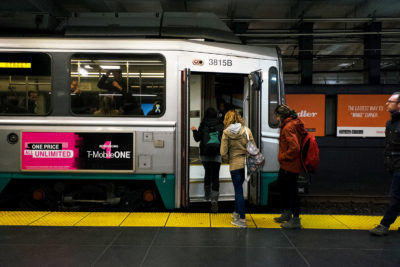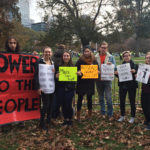
Painful commutes may be a thing of the past for bus and T riders alike as Boston pursues time-saving upgrades to the Massachusetts Bay Transportation Authority’s bus and above-ground train routes.
The MBTA plans to expand its Transit Signal Prioritization technology, which reduces the stop time for transit vehicles operating in mixed traffic by extending their green lights or shortening their red lights, according to a slideshow provided by the MBTA.
The technology is set to be launched for the Green Line B branch on Commonwealth Avenue and the Green Line E branch on Huntington Ave, two of four larger corridors which will be updated with the technology within the next year, according to the slideshow.
MBTA data from pilot testing on the B, C and E lines shows the average recorded extension of green lights ranged 10 to 14 seconds, while red lights were only reduced by an average of six to eight seconds, according to the slideshow. The pilots showed “no demonstrable negative effect to general traffic.”
Brian Kane, the director of operations analysis at the MBTA, said in a statement the ultimate goal of the initiative is to bring faster service to their “street-level” customers.
“The first phase of the pilot along eight signals at six intersections provided positive results with Green Line trolleys and affected bus routes given the priority to proceed through traffic – with no complaints received from everyday motorists,” Kane said in the statement.
The MBTA said they will continue piloting TSP on multiple corridors through 2018, and they hope to expand the technology to high-ridership corridors by 2019, according to the slideshow.
Expanding TSP would enhance public transit by improving T and bus reliability, reducing average travel time, increasing network capacity and enhancing on-time performance.
Peter Furth, a professor of civil and environmental engineering at Northeastern University, said TSP technology would have minimal effects on motorists.
“From an efficiency point of view, it makes more sense to make three or four people waiting in cars wait a little longer, rather than stop a train with 120 people and make them all wait for a minute or more,” Furth said. “Trains need only a few seconds to get through the intersection, so impact on cars whose light is held red a little longer will hardly be noticeable.”
Furth said expanding TSP would be an asset to the MBTA because it would increase the efficacy of public transportation.
“It is important to society to attract more people to transit, and making the transit trip faster does just that,” Furth said.
Several Boston residents said they believe TSP technology could improve commute times.
Katie Davis, 31, of Allston, said technology like this could be especially helpful to Green Line services.
“This new system would be a huge plus for people on the Green Line,” Davis said. “It’s the slowest line right now and less people use it for that reason and that it’s not as accessible, but I think this plan would help that. It’s great that the MBTA is working to fix that problem.”
Kiara Zani, 25, of Jamaica Plain, said she uses non-public transportation like Uber or Lyft due to how slow public transportation currently is.
“It may be a bit more expensive but, it’s faster than the Green Line,” Zani said. “If they really want more people to use public transportation instead of those other ride services, then they need to speed up the Green Line with more green lights and maybe less stops.”
Sarina Abbott, 22, of Roxbury, said anything to speed up public transportation is useful.
“I don’t know much about their plans for the Green Line, but of course I’m all for whatever they’re doing to speed it up,” Abbott said. “I know it’s known to be pretty slow with all the stops and car traffic.”
Hannah Schoenbaum contributed to the reporting of this article.




